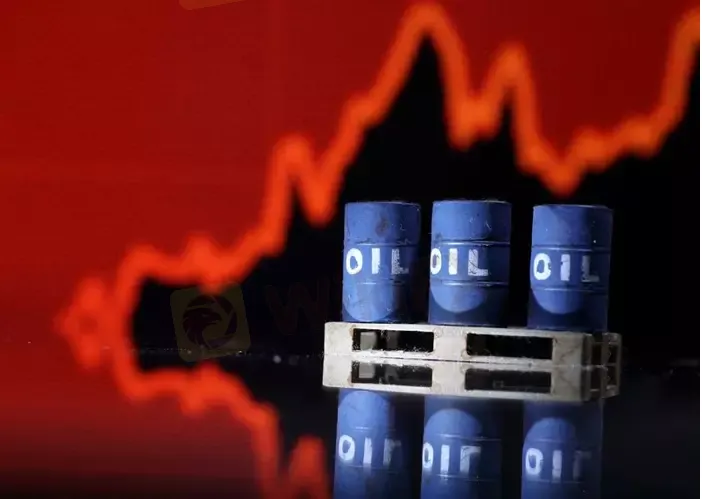简体中文
繁體中文
English
Pусский
日本語
ภาษาไทย
Tiếng Việt
Bahasa Indonesia
Español
हिन्दी
Filippiiniläinen
Français
Deutsch
Português
Türkçe
한국어
العربية
Oil outshines stocks and dollar in 2022
Abstract:Oil prices are proving resilient to global economic recession fears and have outperformed major equity indices and the U.S. dollar so far this year as Western sanctions on Russia further limit supplies to an already tight market.

he two major crude futures contractsare up about 30% so far this year, while the All Country World Index (ACWI) is down about 15%, Refinitiv Eikon data shows.
MSCIs 47-country world stocks index suffered its biggest first-half drop since its creation in 1990 as inflation hit 40-year highs and central banks raised interestrates.
The U.S. dollar index, which measures the value of the greenback against a basket of other major currencies, is up about 10% so far this year, the data shows.

“Low oil inventories and dwindling spare capacity have been the drivers of the oil rally,” UBS analyst Giovanni Staunovo said.
For much of the last two years, production by the Organization of the Petroleum Exporting Countries and allies led by Russia, together known as OPEC+, has been below agreed output targets as many members struggle with capacity issues. The supply shortfall hit about 3 million barrels per day in June – about 3% of global supplies – OPEC+ internal data shows.
“The bullish commodities conviction holds as long as demand levels are still above supply levels,” bank MUFG said.
“By contrast, financial markets are anticipatory assets driven by the growth ‘rate’ of demand, which is evidently falling”.
Oanda analyst Craig Earlam added that equities have been negatively impacted by various developments including the oil price itself, which is contributing to spiralling inflation levels.
While JP Morgan revised lower its global oil demand forecasts for this year and next, it says that the oil market is yet to price in a recession.
The bank added that while historical evidence suggests that oil demand is well supported as long as global growth remains positive, oil prices tend to fall in all recessions by 30% to 40%.

Disclaimer:
The views in this article only represent the author's personal views, and do not constitute investment advice on this platform. This platform does not guarantee the accuracy, completeness and timeliness of the information in the article, and will not be liable for any loss caused by the use of or reliance on the information in the article.
Read more

CySEC Revokes UFX Broker Licence as Reliantco Halts Global Operations
The Cyprus Securities and Exchange Commission (CySEC) has officially withdrawn the Cyprus Investment Firm (CIF) licence of Reliantco Investment Limited, the operator of UFX.com. This decision followed a six-month period during which the company failed to provide any investment services or perform investment activities.

Elon Musk Sparks Debate Over Presidential Power and Federal Reserve Independence
Elon Musk has voiced his support for the controversial idea that United States presidents should have a role in shaping Federal Reserve policies. This endorsement aligns with recent remarks from President-elect Donald Trump, who has hinted at revisiting the central bank's independence, a long-held tradition in the nation's financial governance.

Consob Sounds Alarm: WhatsApp & Telegram Users Vulnerable to Investment Scams
Italy's financial regulator, Consob, has raised alarms over an increase in fraudulent schemes targeting investors through mobile messaging platforms such as WhatsApp and Telegram.

Crypto 101: Coins vs Tokens
For those new to the world of cryptocurrency, terms like "coin" and "token" may seem interchangeable. However, understanding the distinction between these two digital assets is crucial for navigating the crypto landscape. Both coins and tokens serve as integral components of blockchain ecosystems, yet they differ in their functionalities, use cases, and the technologies underpinning them.
WikiFX Broker
Latest News
BSP Shuts Down Uno Forex Over Serious AML Violations
ACY Securities Expands Global Footprint with South Africa Acquisition
Tokyo Police Arrest 4 for Unregistered FX Trading Scheme
Rupee gains against Euro
WikiEXPO Global Expert Interview: The Future of Financial Regulation and Compliance
DFSA Warns of Fake Loan Approval Scam Using Its Logo
Consob Sounds Alarm: WhatsApp & Telegram Users Vulnerable to Investment Scams
CySEC Revokes UFX Broker Licence as Reliantco Halts Global Operations
Axi Bids AUD 52M to Acquire Low-Cost Broker SelfWealth, Outbidding Competitor Bell Financial
Crypto Influencer's Body Found Months After Kidnapping
Currency Calculator



